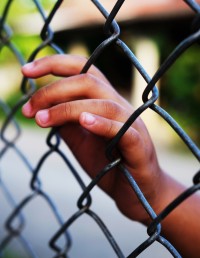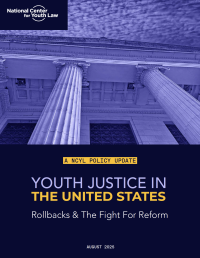NCYL Aims to Transform Youth Justice in California
The National Center for Youth Law is sponsoring a package of bills that aims to transform youth justice in California by creating meaningful diversion and rehabilitation opportunities for youth that come into contact with the law. The effort focuses on diversion that is developmentally-appropriate and proven effective at promoting community health, and public safety. Whenever possible, NCYL believes youth should receive these services close to home in culturally appropriate community-based settings.
Two bills authored by Senators Holly Mitchell and Ricardo Lara will ensure youth get the support and services they need, in environments most appropriate for their age. SB 439 would protect children 11 years old and younger from the effects of formal justice involvement by ensuring their underlying needs are addressed through alternative child-serving systems and community-based programs. SB 1391 will ensure that 14 and 15 year olds are held accountable in the juvenile system where they are required to participate in treatment, counseling, and education, and would prohibit them from being tried as adults in criminal court or sentenced to adult prison terms. Research has demonstrated that youth are less likely to commit new crimes if they are handled by the juvenile system as opposed the adult system, where they receive services focused on healthy development and rehabilitation.
In recent years, California has taken big steps towards protecting another vulnerable population of youth from harmful justice system involvement, commercially sexually exploited children, by passing reforms that clarify these children are victims of abuse and preclude them from being arrested and charged for prostitution. With these reforms, California has recognized the harmful effects of arresting exploited children for their perpetrators’ crimes and has helped counties develop victim-centered responses. However, many law enforcement officers remain unaware of the changes or how to respond effectively when sexual exploitation is suspected. AB 2992, authored by Assemblymember Tom Daly, ensures that police officers receive training on the dynamics of child sex trafficking and their role in helping youth access services. AB 2992 will equip our law enforcement partners with the knowledge and skills needed to protect sexually exploited children, and help connect exploited youth to community-based services.
Unfortunately, California has fallen behind when it comes to protecting vulnerable foster youth living in shelters, according to a San Francisco Chronicle investigation. The county shelters in the state’s foster care system are supposed to serve as a refuge for vulnerable children removed from unsafe homes. Instead, they have funneled hundreds of children, some as young as 8 years old, into the justice system for relatively minor incidents. NCYL is working with Assemblymember Mike Gipson on a $7.5 million budget proposal to ensure these facilities refer youth to community-based services and programs such as college preparation, mental health services and extracurricular activities such as art, music and sports.
A disproportionate number of youth in conflict with the law are children of color, low income, children with disabilities, girls, youth who identify as LGBTQ, and foster children. These particularly vulnerable youth often suffer from abuse, abandonment, neglect, trauma and developmental disabilities that influence their behaviors. Too often, reactions to these treatable behaviors are punitive, starting a cycle of incarceration and perpetuating grave racial injustices that exist in the justice system. The time is now for California to envision a youth justice system that is developmentally appropriate and encourages the healthy development and wellbeing of all of our children. This package of reforms will help California create the compassionate systems our youth deserve.
While testifying at a legislative hearing for SB 1391, Frankie Guzman, Director of NCYL’s California Youth Justice Initiative, said, "I am not an exception, but a representation of what happens when young people who commit the most serious crimes get the support and services that they need." Youth need care, not cages.





